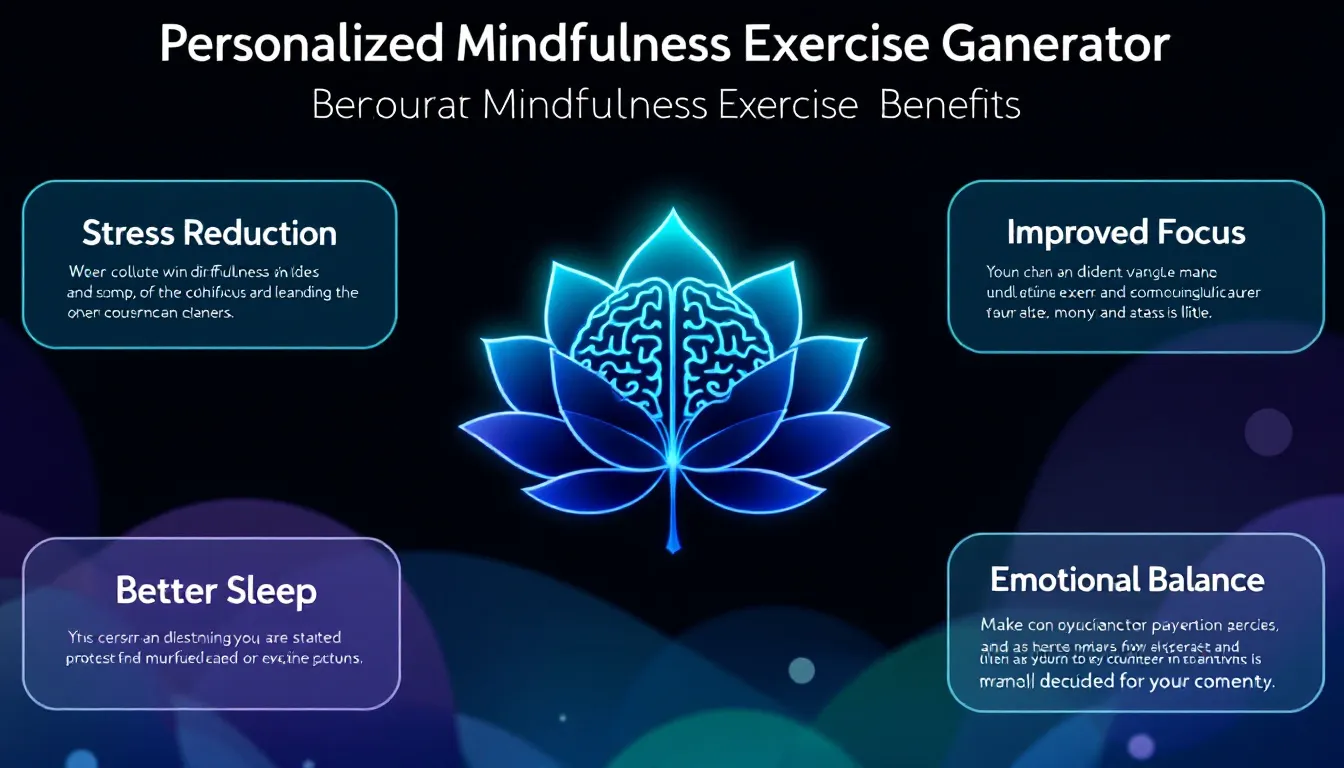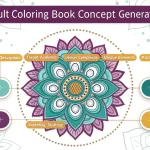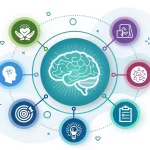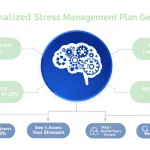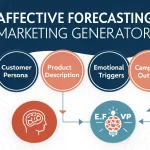Mindfulness Exercise Generator
Is this tool helpful?
How to Use the Mindfulness Exercise Generator Effectively
Follow these steps to create a personalized mindfulness exercise that fits your needs and lifestyle:
-
Set the exercise duration: Enter the length of your mindfulness session in minutes. For example:
- 12 minutes for a quick midday refresh
- 25 minutes for a calming evening routine
-
Choose your focus area: Select the main purpose of your mindfulness practice. Examples include:
- Enhancing emotional resilience
- Boosting mental clarity before important tasks
-
Specify your experience level: Let the generator know your familiarity with mindfulness. This helps customize the exercise. You might select:
- Intermediate for moderately experienced practitioners
- Advanced for those with a strong mindfulness background
-
List any specific techniques you prefer (optional): Include mindfulness methods you’d like to incorporate. For example:
- Focused breathing and body scanning
- Visualization and loving-kindness meditation
- Click the Generate Mindfulness Exercise button to receive your customized practice plan.
Once generated, you can copy the mindfulness exercise text to your clipboard for easy access or sharing with friends and wellness groups.
What Is the Mindfulness Exercise Generator and Why Use It?
The Mindfulness Exercise Generator is an online tool that creates personalized mindfulness routines based on your preferences. It helps you build focused, manageable exercises that reduce stress, sharpen focus, and support emotional balance.
By tailoring each exercise to your experience level, desired duration, and specific goals, the generator crafts practical mindfulness sessions you can seamlessly integrate into your daily life.
Whether you’re new to mindfulness or an experienced practitioner, this tool supports sustained mental wellness and clarity through customized exercise recommendations.
How Personalized Mindfulness Practice Supports You
Mindfulness becomes more effective when it matches your unique needs. This generator factors in your input to suggest techniques and practices that align with your schedule and goals. Personalization helps you stay engaged and makes mindfulness easier to maintain consistently.
Practical Uses of the Mindfulness Exercise Generator
Here are some real-life scenarios that show how this tool enhances various aspects of daily living:
1. Managing Daily Work Stress
- Set duration to 7 minutes for a quick reset.
- Focus area on workplace stress relief.
- Choose experience level as beginner.
- Include techniques like deep breathing and progressive muscle relaxation.
The generator creates a brief routine combining breathing exercises and body relaxation to release tension during hectic workdays.
2. Enhancing Sleep Quality at Night
- Set duration to 18 minutes.
- Focus on relaxation and better sleep.
- Experience level: intermediate.
- Techniques could be body scans and guided imagery.
This practice helps calm your mind and gently relax your body before bedtime, supporting deeper, more restful sleep.
3. Supporting Emotional Regulation
- Duration: 15 minutes.
- Focus area: emotional balance and awareness.
- Experience level: advanced.
- Preferred techniques might include loving-kindness meditation and mindful breathing.
The generator designs exercises that increase emotional awareness, helping you respond to feelings with calmness and clarity.
Key Benefits of Using a Personalized Mindfulness Tool
Stress Relief and Anxiety Reduction
Personalized exercises train your mind to stay present and reduce the impact of daily stressors, lowering anxiety levels effectively.
Improved Focus and Mental Clarity
Targeted mindfulness practices enhance your attention span and help you maintain concentration in busy environments.
Better Emotional Regulation
Mindfulness strengthens your ability to recognize and manage emotional responses, promoting a balanced mood.
Enhanced Sleep Quality
Calming mindfulness routines reduce racing thoughts before bed and support restorative sleep cycles.
Greater Self-Awareness
Regular practice fosters deeper insight into your thoughts and behaviors, encouraging personal growth.
Pain Management Support
Mindfulness helps change your relationship with discomfort, easing suffering through acceptance and awareness.
Cardiovascular Benefits
By lowering stress and promoting relaxation, mindfulness exercises can contribute to healthier blood pressure and heart function.
Using the Mindfulness Exercise Generator in Everyday Life
This tool fits naturally into various lifestyles and challenges. Here are examples of practical applications:
Study and Exam Preparation
Students can build mindfulness routines tailored to reduce exam anxiety and improve focus, helping them perform better under pressure.
Athlete Performance Enhancement
Athletes can develop mental routines that boost concentration, ease pre-competition nerves, and sharpen reaction times.
Mindful Parenting Practices
Parents can cultivate patience and presence using customized mindfulness exercises that ease stress and strengthen family connections.
Important Disclaimer
The calculations, results, and content provided by our tools are not guaranteed to be accurate, complete, or reliable. Users are responsible for verifying and interpreting the results. Our content and tools may contain errors, biases, or inconsistencies. Do not enter personal data, sensitive information, or personally identifiable information in our web forms or tools. Such data entry violates our terms of service and may result in unauthorized disclosure to third parties. We reserve the right to save inputs and outputs from our tools for the purposes of error debugging, bias identification, and performance improvement. External companies providing AI models used in our tools may also save and process data in accordance with their own policies. By using our tools, you consent to this data collection and processing. We reserve the right to limit the usage of our tools based on current usability factors.
